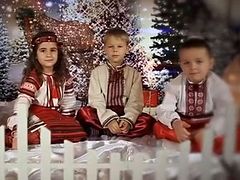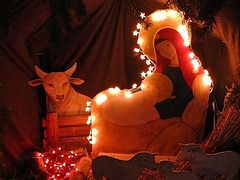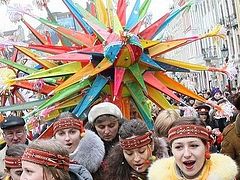It seems all kids are alike, both in Moscow, and in the distant Ural Mountains. Seeing children on Christmas reminds me of my own childhood. After all, I was just like them!
“We’re getting together to go caroling,” a neighbor boy told me. “Last year we went, gathered a whole stash of treats, and they even gave us cash!”
“So, what do you really do, when you go caroling?”
The boy thought about it. “Well, in general we dress up in costume. Romka as a maiden, Mishka as a sort of beast. I put makeup on my face, red on my cheeks and nose, and black around my eyes.”1
“Yes, yes, that’s an awful sight alright, but something’s not right … you know … I also went Christmas caroling when I was your age, I tell you what, come to my door and I’ll teach you a thing or two.”
The boy dashed off and returned with his friends, and they said a rhyme in Russian: “Praise be, praise be, you don’t know me! Open up your pantry and give us treats and sweets!”
“And…?” I asked. “Well…now you give us something and we move on to the next house.”
“So why did you come here, only for candies? You’re going out on Christmas, you’re supposed to carry the good tidings of the birth of the Son of God! That’s what Christmas caroling is all about! Why don’t you do this: Read your poems and rhymes, and instead of asking for candy right afterwards, sing some actual Christmas carols! Learn “‘In the Dark Night’, or ‘Heaven and Earth’!” It’s a great joy to deliver this Good News. You are the messengers of joy and salvation! I saw you in church before—how do they sing there? Did you learn, “Glory to God in the Highest Heaven…”?
“And peace on earth to men, who enjoy His favor,” the boy said, recalling the words of the Great Doxology. “Good! And what about the Troparion of the Nativity? Do you know it by heart?” “Daniel and George know it, they help the priest. They will also carol with us.”
My new acquaintances ran off, and in the evening when there was a cheerful knock on the window, I realized that it was them. I was ready to meet them. I had gone in the afternoon to get gingerbread, candy, and cookies. They came, and not just them, but a whole group of ten, holding up a decorative star, singing carols: “Carols, carols, open the door!” They showered me with a handful of grain, and sang together: “Christ is born; glorify Him! Christ comes from heaven; go to meet Him! Christ is on earth; be exalted! Sing to the Lord, all the earth! And praise Him in gladness, O people, for He has been glorified!”2
Among the carolers there was a snow maiden with long braids in a kokoshnik, a boy, for some reason in a foreign hat, another boy, painted in various colors, a third in a robe with stars. They sung together the troparion of the Nativity, “Thy Nativity oh Christ our God…!”
I was just getting ready to reward such good work, when suddenly, with a painful gasp, the little girl with the scythe fell to the floor. They all screamed, and I was so scared that my heart sank; I began to look for a phone to call the hospital. I thought: “Why is she sick? Is she practically starved, or on the contrary, did she eat too much candy?”
“Doctor, doctor!” the children shouted.
And only when the “doctor,” a boy with fancy glasses painted on his face, appeared, I happily realized that all this was all part of the act. The doctor felt her pulse, looking at his watch, straightened up, paused, and sighed: “Medicine is powerless here.”
“Pellar, wise pellar!”3 the girls shouted.
A “wise healer” also came in an elaborate zupan and costume. He began to treat the patient extremely carelessly. He tugged at her arms and legs, and said, “Well, folk medicine is powerless here too.”
Then the brilliant actors fell silent, and the patient lay as if dead. Then the girl who had called the doctor threw up her hands: “Oh, I know, I know! Circle dances and songs will save her!” “And you are with us?” Asked the girl. “She needs to be revived!”
Of course, how could I not participate! We danced along, and sang a carol. I remembered my childhood in days of old. “I, a little boy, bring God a sheaf of wheat. Save me oh God, my father and mother, our hut, and our village, and our fate!” We sung and the beauty came to life.
We drank lemonade, ate cookies and gingerbread, and soon they departed. But at parting they made a girl sing, who stood aside and was silent. And she, desperately shy and clutching her mittens in her hands, began to sing in a quiet voice:
“I walked by foot to the city of Bethlehem.
I found the cave, and saw that born within,
was Christ the Savior, Creator, God, and King.
He was there, poor and laying in a manger.
And I asked the Virgin a question. ‘Why is Little Christ crying so?’
The Virgin told me: ‘He is crying because he knows that Adam and Eve
were taken captive by the enemy. And that the image of God,
which was given to their souls,
was delivered to the desecration of the vicious enemy…’”
The girl could not finish—she suddenly burst into tears and ran out the door. The boys shuffled in embarrassment. “She had a long song. She also sings about these roses which Christ gave away to children, and left for Himself only the thorns.”
The kids finally went home. We were left on a moonlit night, our felt boots crunching on Christmas snow, with a red icon lamp in the corner, like a star that came down from heaven, hovering over the holy icons.




